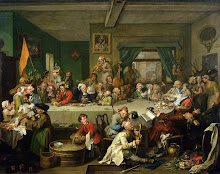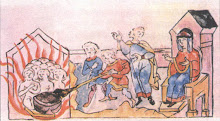
"[M]y extremely delicate health...and all too sensitive heart, with an irrepressible--shall I call it Genius?--struggling for recognition, if nothing more..."Of all the many miscreants who helped make Poe’s last few years so painful, arguably the strangest of the lot was an otherwise nondescript Massachusetts housewife and poet named Jane Ermina Locke, whose latent talent for mayhem burst into full flower when she met Poe.
-Jane E. Locke, 1850
Late in 1846 reports of Poe’s distressing poverty and illness were widely circulated in the newspapers. The list of his calamities only increased when these stories brought him to the attention of 41-year-old Mrs. Locke. She was inspired to publish a poem, “An Invocation for Suffering Genius,” (“Oh Charity, where hast thou fled with heavenly lustered wing/While on her low and sorrowing bed genius lies suffering?”) and in February 1847, several weeks after the death of Poe's wife Virginia, she sent him a warm expression of condolence. All of her attentions were likely inspired by the hope of utilizing him to further her own literary career, which, to her own great frustration, had failed to convince the world of her "Genius."
A correspondence was established between them, but as only three letters of his and one of hers survive, it is hard to gauge its exact nature. It is assumed that Poe saw this woman--of whom he knew nothing--as a potential second wife, but his extant letters are so stilted and artificial, it is hard to know for certain what he thought of her. There is no evidence of genuine warmth in his attitude, but he was always desperately receptive to sympathy wherever it could be found--sympathy he particularly needed after Virginia’s death--so it would not be unreasonable if in his loneliness he hoped that this stranger who was so open in her admiration for him might prove to be something more than a pen-pal.
For some months, however, the only tangible result of their epistolary acquaintance was another poem she addressed to Poe, “The True Poet,” which appeared in the June 1, 1848 “New York Morning Post.” She breathlessly described him as “the poet of her heart.”
There is some uncertainty about their first personal meeting. In the 1870s, both Sarah Helen Whitman and Annie Richmond told John H. Ingram that in the spring of 1848, Mrs. Locke visited Fordham in order to invite Poe to deliver a lecture at her residence of Lowell, Massachusetts. Presumably, he then learned that his admirer was not, as he may have imagined, well-to-do and unattached, but an impecunious, very married woman with numerous children. However, a contemporary--so presumably more reliable--letter written by Annie’s brother A.B. Heywood stated that when Poe came to Lowell in July, encountering the ineligible and undesirable Mrs. Locke for the first time was a disconcerting experience for the poet.
In any case, Poe’s Lowell lecture marked the beginning of the end of his nascent friendship with Mrs. Locke. While staying at her home, he met her friend and neighbor Mrs. Richmond, and, it was said, immediately transferred his affections to her. According to Sarah Helen Whitman, during this visit “the two ladies apparently vied with each other for Poe’s attention.” As a result, “A quarrel …had sprung up between the two ladies, and before he left, open hostility was declared.”
Jane Locke did not give Poe up without a fight. In her own inimitable fashion, she wooed him by sending a simply astonishing thirty-one stanza poem in his honor entitled “Ermina’s Tale.” ("I felt as in the presence of a god!")
"Henceforth the raven's beak my heart shall bear,The full text can be found here. Lengthy as it is, it needs to be read in its whole to get the full flavor of “Ermina’s” singular personality.
And the strange flapping of its ebon wings
Fan my sad spirit to a deep despair,
Wild as the 'nevermore' it ceaseless sings."
Incidentally, I now know what killed Poe. It was the aftereffects of Mrs. Locke's poetry.
This effusion failing to win Poe’s heart, Mrs. Locke bewailed the end of love’s dream with the inevitable verses. “The Broken Charm” appeared in the “Boston Notion” in February 1849:
“Not that I thought to clasp thee as mine own. —After getting this off her chest, Mrs. Locke, like Mary Stuart after the murder of Rizzio, studied revenge. It was said she turned her efforts towards destroying both him and her “rival,” Mrs. Richmond. In the 1870s, Annie Richmond gave John Ingram a copy (the original is not extant) of a letter she claimed to have received from Poe early in 1849. In this letter, he railed against the “malignant misrepresentations” of Mrs. and Mr. Locke. According to this letter, Poe had quarreled with the Lockes over their insulting attitude towards the Richmonds. After this offense to their “insane vanity and self-esteem,” the Lockes retaliated by “ransacking the world for scandal” to use against him, with the result that Mr. Richmond (who is a curious cipher in this whole domestic melodrama) came to distrust Poe.
But I had robed thee with such holiness,
And round thy form a veil of glory thrown,
I can but weep before the false impress.”
“Annie” informed Ingram that she showed this letter of Poe’s to her husband, who gallantly responded by sending the Lockes a letter “denouncing them in the strongest terms.”
According to the copies of Poe’s letters provided by “Annie,” this distressingly childish squabble went on for some time. Whatever the exact truth of the details--“Annie” was not as reliable a source as we would wish--it is indisputable that Poe and Mrs. Locke became estranged, although her attitude towards him remained unhealthily fanatical.
The whole episode, unedifying as it was, did not lack comic relief. According to yet another of Mrs. Richmond’s copies of her correspondence, in the spring of 1849 Poe wrote with undisguised horror that Mrs. Locke informed him that she was writing a roman a clef about their relationship. According to this letter, her tell-all novel--which, if it was anything like her poetry, would have been one for the ages--was about to be published. This is the first and last we hear of the book, however, making it impossible to know if:
A: Mrs. Locke had truly written such a manuscript, only to have saner heads in the publishing world pull the plug on her project.
B: She was only using the threat of publication as a way of getting a hold over Poe.
C: Poe or Mrs. Richmond simply invented the story.
Sarah Helen Whitman also provided testimony that Mrs. Locke’s stalkerish ways had not abated. Although her own relationship with Poe was over by 1849, she later said that in the spring of that year, Mrs. Locke sent her many invitations to visit Lowell. As the woman was a complete stranger, she declined. However, “Ermina” was so persistent in her demands for a visit that she finally gave in. Mrs. Whitman later wrote that although she liked both the Lockes very much (a statement that speaks eloquently about her judgment,) she began to suspect that “Her object in seeking my acquaintance was unquestionably to prevent any renewal of my correspondence with Mr. Poe, by whom she concieved [sic] herself to have been deeply wronged.” In another letter, Mrs. Whitman expressed her belief that Mrs. Locke hoped to “pique the Raven” by exhibiting her as a houseguest, “or perhaps bring about a reconciliation with him through my means.” (How Mrs. Whitman--herself bitterly estranged from Poe--could possibly “bring about a reconciliation” is something only she and her ether bottle could answer.)
She went on to say that after this visit to Lowell, Mrs. Locke continued to bombard her with letters expressing her continuing obsession with Poe. Mrs. Whitman observed that her unwanted correspondent “was too much under the influence of wounded pride to exercise a calm judgment in the matter.” This was evidently Sarah Helen’s typically milquetoast way of saying, “crazy with a side of fries.”
Poe’s demise did nothing to end Mrs. Locke’s unfortunate fixation on him. Her first act, of course, was to publish a "Requiem to Edgar A. Poe." ("Strike the anthem, bards and brothers/Softly sweep your many lyres/Let the low and solemn requiem/Linger on their silver wires!")
According to Mrs. Whitman, Mrs. Locke followed this public expression of affectionate mourning by writing her a letter “to say that [Poe] had spoken disrespectfully of me to his friends in Lowell. In reply I made no allusion whatever to the paragraph in question. In her next letter she repeated the assertion. I passed it in silence as before. She then came to Providence and passed a night with me. On her attempting to introduce the subject which she had so often touched upon in her letters I interrupted her by saying that I did not wish to listen to any charges against one whose memory was dear and sacred to me,--that if false they could not now be refuted,--if true, I could understand and forgive them. . . I fear from her own confessions, that she has sometimes used my name very unwarrantably to endorse her own opinions of Mr. Poe's character. In a letter to Mr. Willis, written about the time of Edgar's death, she ventured to do so--citing me as authority for some impressions which she entertained with regard to his moral character. I wrote Miss Lynch at the time, requesting her to set Mr. Willis right on the matter, but as some coolness then existed between Miss Lynch and myself I am ignorant whether the request was ever complied with." Such shenanigans did not escape Maria Clemm's attention. Poe's "Muddy" wrote Thomas Holley Chivers that she had not seen Mrs. Locke since "Eddie's" death: "She spoke unkindly of him since then and that is sufficient to make me hate her."
"Ermina," in between episodes of Griswoldian trashing of the late poet's memory, also spread the word that Poe had left a fond “deathbed message” to her--conveyed via Mrs. Whitman!--a self-serving fabrication that left Mrs. Clemm sputtering in fury at her presumption: “Mrs. L[ocke] would have been the last woman in the world he would have written to…She will have to be more cautious how she speaks of him or I will have to speak as she will not wish.”
In the doughty Mrs. Clemm, we may have finally found the person capable of getting Jane Ermina Starkweather Locke to just shut up. The turbulent Mrs. L. made a quiet retreat until her death in 1859.
"Ermina," in between episodes of Griswoldian trashing of the late poet's memory, also spread the word that Poe had left a fond “deathbed message” to her--conveyed via Mrs. Whitman!--a self-serving fabrication that left Mrs. Clemm sputtering in fury at her presumption: “Mrs. L[ocke] would have been the last woman in the world he would have written to…She will have to be more cautious how she speaks of him or I will have to speak as she will not wish.”
In the doughty Mrs. Clemm, we may have finally found the person capable of getting Jane Ermina Starkweather Locke to just shut up. The turbulent Mrs. L. made a quiet retreat until her death in 1859.
(Image via eapoe.org.)















